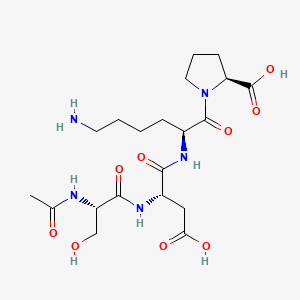m6A-centered Drug Response Information
General Information of the Drug (ID: M6ADRUG0026)
| Name |
AcSDKP
|
||||
|---|---|---|---|---|---|
| Synonyms |
AcSDKP; Seraspenide; BIM-32001; Goralatide; Acetyl-seryl-aspartyl-lysyl-proline
Click to Show/Hide
|
||||
| Status | Phase 2 | [1] | |||
| Structure |
 |
||||
|
3D MOL
|
|||||
| Formula |
C20H33N5O9
|
||||
| InChI |
InChI=1S/C20H33N5O9/c1-11(27)22-14(10-26)18(31)24-13(9-16(28)29)17(30)23-12(5-2-3-7-21)19(32)25-8-4-6-15(25)20(33)34/h12-15,26H,2-10,21H2,1H3,(H,22,27)(H,23,30)(H,24,31)(H,28,29)(H,33,34)/t12-,13-,14-,15-/m0/s1
|
||||
| InChIKey |
HJDRXEQUFWLOGJ-AJNGGQMLSA-N
|
||||
| PubChem CID | |||||
| TTD Drug ID | |||||
Full List of m6A Targets Related to This Drug
Protein patched homolog 1 (PTCH1)
| In total 1 item(s) under this target gene | ||||
| Experiment 1 Reporting the m6A-centered Drug Response by This Target Gene | [2] | |||
| Response Summary | AcSDKP in liver fibrosis via m6A modification and Hedgehog pathway, which helps us to shed light on the molecular mechanism in liver fibrosis progression. WTAP targeted the 3'-UTR of Protein patched homolog 1 (PTCH1) mRNA, and administration of AcSDKP reduced the stability of Ptch1 mRNA. | |||
| Responsed Disease | Hepatic fibrosis | ICD-11: DB93.0 | ||
| Target Regulator | Wilms tumor 1-associating protein (WTAP) | WRITER | ||
| Target Regulation | Down regulation | |||
| Pathway Response | Hedgehog signaling pathway | hsa04340 | ||
| Cell Process | Cell apoptosis | |||
| In-vitro Model | HSC (Hematopoietic stem cell) | |||
| In-vivo Model | Male Sprague-Dawley rats (375-400 g) liver fibrosis was induced by subcutaneous injection of carbon tetrachloride (CCl4) and olive oil (a ratio of 2:3) twice per week. | |||
References